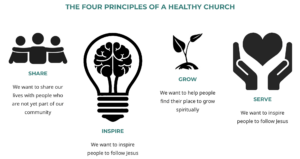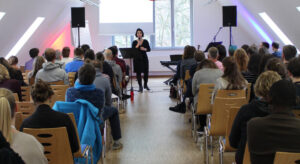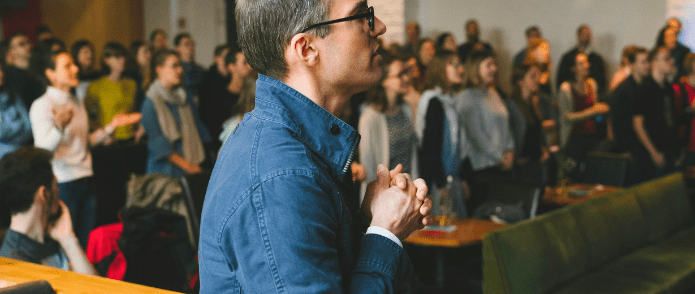Urban ministry leader Cris Zimmermann doesn’t need Barna or Pew surveys to show him that secularism has outpaced Christianity, that biblical literacy is nearly extinct and that hardly anyone these days knows who Jesus is.
Zimmermann sees that reality firsthand in his native Germany, which is among the least-churched Western nations and an example many U.S. Christians fearfully cite as a harbinger of what is to come as Americans increasingly abandon faith.

Cris Zimmermann
“I live in a country where less than 1% say they are Bible-believing Christians,” explained Zimmermann, senior pastor of Church in Action — or Kirche in Aktion, in German — during a Jan. 12 webinar about the Frankfurt-based ministry.
There are many nominal Christians thanks to Germany’s history as the birthplace of the Protestant Reformation, but average church attendance is so low that a congregation with 100 worshipers on a Sunday is considered a megachurch, he said.
And it’s a tough operating environment for many religious groups. While the federal government funds the salaries and operating expenses of the Catholic and Lutheran churches, all other churches must fend for themselves in a population that has no concept of tithing.
“There is a great tradition, but there is no spiritual vitality,” the pastor said. “There are no faith expressions here in Germany, and sadly this is true about the rest of Europe as well. You can come and see we have great cathedrals that are architecturally brilliant, but we don’t have people. We don’t have hearts burning for Christ.”
Entrepreneurial relationship building
Church in Action has used an entrepreneurial and relationship-building approach to push back against those trends in more than 12 years of existence. Before the COVID-19 pandemic introduced strict bans on public gatherings in Germany, the group was operating 50 ministry locations in five Central German cities and holding worship services in 16 locations including coffee shops, movie theaters, retirement homes and bars.
The organization also operated a youth center, helped the elderly in nursing homes and launched a ministry for victims of sex trafficking in a nation where prostitution is legal. “We even baptized a few hundred Muslims who converted,” he said.
It also operated global missions, sending 150 people annually on education, feeding, health care and water projects around the world. “And half of those going with us were non-Christians.”
“There were some crazy projects and just some fun evenings, and I would say 95% of the rooms were filled by non-Christians.”
There were constant fundraisers and social gatherings designed only to build friendships, Zimmermann said. “There were some crazy projects and just some fun evenings, and I would say 95% of the rooms were filled by non-Christians.”
‘On earth as it is in heaven’
Inspired by the “on earth as it is in heaven” line from the Lord’s Prayer, Church in Action began with a calling to spread hope and love. “We were to go and change the city and bring heaven into the world,” Zimmermann said.

Church in Action’s four principles of a healthy church
That calling was too strong to resist, he added. “I was pastoring a church of 100 people, but what was that compared to millions in the city who have absolutely no clue about the gospel and never heard about Jesus?”
The Frankfurt ministry began with gatherings in a pub in 2010. Without proselytizing, relationships began to flourish, and the pub owner eventually took interest in the group and offered the space for fundraising to help refugees, the homeless and others in need, he said.
No effort was made to introduce worship services, Zimmermann said. “For the first two years we did nothing but benefits and charity events and build new friendships in a pub. We hacked our way into the nightlife of Frankfurt.”

A worker in a coffee shop that’s part of the Church in Action ministry.
The ministry’s second location was across town in a coffee shop it owned and operated. It was there the ministry held its first worship gatherings.
“I was celebrating Communion in the coffee shop. I invited them to come and receive Christ. It was a symbol of receiving Christ into their own lives. And people would start converting in this place,” he said.
Church in Action’s third ministry location was in a home for the elderly. Residents were befriended by team members, and 50 out of 100 were regularly attending an ecumenical service offered there.
Two key concepts
Zimmerman and his brother, Philip, created a multiplication culture built on two key concepts: Community on Mission and Kingdom Communities, the small groups that host worship gatherings. Kingdom Communities engage as Community on Mission.
A Community on Mission is a small group of eight to 10 people who meet in an every-other-week rhythm. One week, they meet to exchange ideas, study the Bible and pray together. The other week, they serve together on a chosen project to make heaven visible in a specific area of their city.

The Spielmobile
Those projects range from long-term investment in a brothel ministry to creation of a spielmobile, a children’s activity center on wheels fashioned after the idea of a bookmobile. Due to COVID restrictions, the spielmobile has been temporarily repurposed to deliver food and offer Wi-Fi hotspots.
The name of the brothel ministry is PE/IX. It involves “street teams” who visit the red-light district every other week simply to sit with and befriend women in the brothels. For most of these sex workers, the street team is the only human interaction they get outside of their clients, the bouncers and the other women in their house.
The organization’s website explains: “Church in Action is not visiting the women to help them find their way to a ‘normal life’ or ‘save them’ from their current life. We are there to help them get back in touch with their dreams, to remind them of their value and worthiness as a children of God and assure them that God loves them and is not angry with them.”
While the COVID-19 pandemic has greatly challenged the brothels and the women who relied on them for income — many of the women lost their housing and were left working on the streets — Church in Action created a drop-in center in the heart of the red-light district in Frankfurt. Here, women can come to find a safe and homey place to rest, cook meals from their home country, get clothes and toiletries, and connect with others.

A Church in Action children’s event in a park during the pandemic.
All these ministries intersect a passion for reaching and serving the huge refugee population in Germany. Only four other countries have more refugees within their borders: Turkey, Pakistan, Uganda and Sudan. Germany is estimated to be temporary home to more than 1 million refugees.
Church in Action owns an apartment building that is a registered refugee accommodation. The building can house up to 60 families and provides a safe place for them to land as they work to assimilate into German society. Volunteer hosts coordinate with social workers and government programs to help residents access available resources such as food, work placement, and classes to learn German.
Lessons to share
While many of its operations are currently and drastically curtailed due to the pandemic, the lessons Church in Action have learned are applicable to churches in other nations experiencing rapid declines in attendance, membership and interest, webinar organizers said.
That describes the U.S., where a survey released by the Pew Research Center in December reported 63% of Americans identify as Christians, down from 75% a decade before.

A Church in Action small-group worship gathering
Zimmermann explained that churches operating in cultures where they are the minority must learn to be considerate listeners.
“We have done a lot of training with people in how to talk about your faith in a way that you are not imposing your faith or being the savior of the world but being really respectful.”
Christians in post-Christian cultures also must move away from defining church as a Sunday morning event, he said.
“Mission defines who we are. I’m more like a missionary. I see my city the way a missionary would look at a city, even though I was born here and raised here. But when I enter a pub, I can’t assume the people I talk to have the same kind of value structure or the same kind of ethics I have,” Zimmermann said.
“My thinking is this: How about we don’t define church around the worship gathering, but define the core of church around mission, which means sharing the love of God in word and deed?”
Related articles:
Baylor prof leads innovative team working to disrupt human trafficking
Arkansas church creates innovative program to declare jubilee for those in need
Survey says: Churches could do more on identifying and using spiritual gifts

